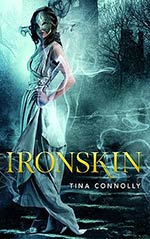
![]() ersandoval
ersandoval
3/11/2013
![]()
When the 2012 Nebula Award nominees were announced, I was pleased to find I had read (and enjoyed) four out of six in the Best Novel category. The fifth has been on my reading list for a while. The sixth, the only one I'd never heard of, was Ironskin by Tina Connolly.
I picked it up so quickly in part because of some idiot comments floating around the web about the genre becoming too girly, and it made me happy that books like this are starting to get serious recognition. Once I read the description, I was curious about what made this book so special that both it and Mary Robinette Kowal's Glamour in Glass were included on the shortlist (both being alternate histories in the regency era).
Ironskin is a retelling of Jane Eyre with fey. Unlike Glamour in Glass, where society is practically unchanged by the addition of magic, Connolly's world is dramatically different. Society had become dependent on fey technology, powering everything from lights to motor cars with magical "bluepacks"--until the Great War. The story starts five years after the war's end. The fey are gone, but the country is left devastated, and scrambling to make do with coal and steam. A generation of young men is slaughtered, and many unlucky survivors are left with fey curses that can only be suppressed by covering the scars with iron. Jane Eliot is one such ironskin, hiding her deformed face with an iron half-mask.
I thought the language was lovely, and really captured the feeling of Jane Eyre. The societal consequences were well-thought out, and I loved the references to slightly altered titles and quotes from plays by "Shakspyr." The fey were very traditional and satisfyingly malevolent in contrast with the recent abundance of urban fantasy reinterpretations.
Jane's interactions with the fey-touched child, Dorie, actually bothered me quite a lot through the first half of the book, but I think they were meant to. It was heartbreaking to watch all the life and spirit drain out of the girl as Jane and her father insisted she deny her fey gifts in favor of acting "human." There were strong reasons for her doing so, but rather lightly touched upon, and I can't help but wish that I could have been made to really believe in those reasons along with Jane.
The other aspect of the story that bothered me was the easy resolution of Jane's dislike of her scarred face by giving her a new, perfect fey face. It feels like a cop-out. I was disappointed in Jane for forcing Edward to make her a new face, and while I loved the horrifying way in which that backfired on her, I hate that she got to be magically beautiful anyway. It sends a conflicting message. On one hand, it tries to convince you that fey beauty is deadly and Jane's scars mark her bravery, but the other hand snatches it all away in the ending with the impression that it can't be a happy ending if she's still ugly. Needless to say, that left a bad taste in my mouth.
If you can overlook that distasteful theme, however, I found Ironskin to be very engaging overall, and the faery queen beats the insane wife in the attic, hands down. Worth a read for fans of the classic.